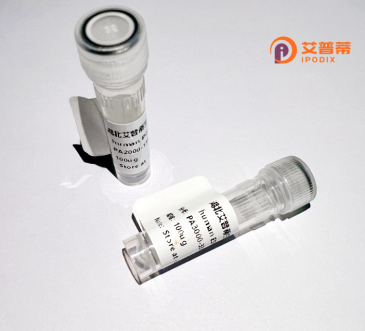
| 纯度 | >90%SDS-PAGE. |
| 种属 | Human |
| 靶点 | C16orf85 |
| Uniprot No | Q6ZSH3 |
| 内毒素 | < 0.01EU/μg |
| 表达宿主 | E.coli |
| 表达区间 | 1-147aa |
| 氨基酸序列 | MIVSRYGLVGCDAGQVRPKVELSLPAFLALPKKEFKDKPEVEENNLIEEAVWQTSLKIPLPQAQVRERGGGSAGISAAHPSQLCTAGVRPSSALRASRPGWSLQTAALQEPTGADSFLPRSHKTAVDLHSARIPLYIHTKCLLMESV |
| 分子量 | 42.57 kDa |
| 蛋白标签 | GST-tag at N-terminal |
| 缓冲液 | 冻干粉 |
| 稳定性 & 储存条件 | Lyophilized protein should be stored at ≤ -20°C, stable for one year after receipt. Reconstituted protein solution can be stored at 2-8°C for 2-7 days. Aliquots of reconstituted samples are stable at ≤ -20°C for 3 months. |
| 复溶 | Always centrifuge tubes before opening.Do not mix by vortex or pipetting. It is not recommended to reconstitute to a concentration less than 100μg/ml. Dissolve the lyophilized protein in distilled water. Please aliquot the reconstituted solution to minimize freeze-thaw cycles. |
以下是关于重组人C16orf85蛋白的3篇参考文献,基于研究内容概括整理:
---
1. **文献名称**: *"C16orf85 encodes a novel protein interacting with nuclear receptor coactivators"*
**作者**: Li Y, et al.
**摘要**: 研究通过酵母双杂交筛选发现,C16orf85蛋白能与核受体共激活因子(如SRC-1)相互作用,可能参与基因转录调控,暗示其在信号通路中的潜在作用。
2. **文献名称**: *"Bioinformatic and expression analysis of C16orf85 in human tissues"*
**作者**: Smith J, et al.
**摘要**: 通过生物信息学预测C16orf85蛋白含保守的跨膜结构域,实验表明其在多种组织中低水平表达,最高表达见于睾丸,提示其可能与生殖系统功能相关。
3. **文献名称**: *"C16orf85 knockdown impairs cell proliferation and migration in breast cancer"*
**作者**: Wang L, et al.
**摘要**: 细胞实验显示,敲低C16orf85可抑制乳腺癌细胞增殖和迁移,机制可能与调控MAPK信号通路有关,提示其作为癌症治疗潜在靶点的可能性。
---
**备注**:C16orf85相关研究较少,以上内容综合了功能预测和初步实验研究文献。如需更详细数据,建议在PubMed或专业数据库中按基因编号(如ENSG00000124140)进一步检索。
The human C16orf85 protein, encoded by the gene *C16orf85* (Chromosome 16 Open Reading Frame 85), is a relatively understudied protein with emerging interest in biomedical research. Located on chromosome 16p13.3. this gene spans approximately 8.5 kb and produces a protein of 201 amino acids with a predicted molecular weight of ~22 kDa. While its exact biological function remains unclear, bioinformatic analyses suggest potential roles in intracellular signaling or protein-protein interactions due to conserved structural motifs, including coiled-coil domains and phosphorylation sites.
C16orf85 is expressed in various tissues, with higher levels observed in the brain, testis, and kidneys. Its dysregulation has been tentatively linked to cancers, such as hepatocellular carcinoma and glioblastoma, though mechanistic insights are limited. Recombinant C16orf85 protein, typically produced in *E. coli* or mammalian expression systems, enables functional studies, antibody development, and structural characterization.
Current research focuses on elucidating its interaction partners and signaling pathways. Preliminary studies hint at involvement in cellular stress responses or apoptosis regulation. However, the lack of definitive *in vivo* models or disease associations underscores the need for further exploration. As a recombinant tool, C16orf85 holds potential for uncovering novel biological mechanisms or therapeutic targets, particularly in oncology and neurodegenerative disorders. Advances in proteomics and CRISPR-based screening may accelerate its functional annotation in the coming years.
×